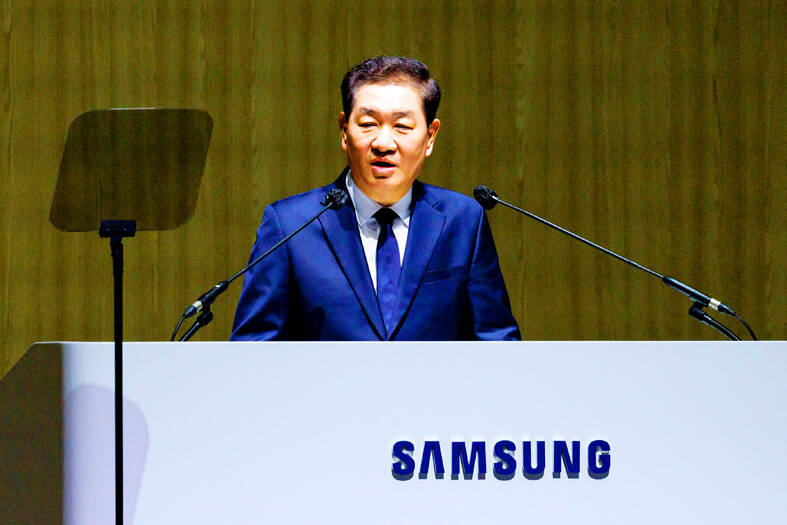Samsung Electronics Co yesterday said it is looking at major deals to drive growth, as it faced tough questions from shareholders after its failure to ride an artificial intelligence (AI) boom made it one of the worst-performing tech stocks last year.
The South Korean firm has been suffering from weak earnings and sagging share prices in recent quarters after falling behind rivals in advanced memory chips and contract chip manufacturing, which have enjoyed strong demand from AI projects.
Shareholders slammed management for poor stock performance and called for measures to revive stock prices at the meeting.

Photo: Reuters
Samsung co-CEO and head of semiconductor business Jun Young-hyun pledged to catch up in the high-bandwidth memory (HBM) chip race and apologized for the company’s poor stock performance.
“We were late in reading the market trends and we missed out on the early market as a result,” Jun said at the meeting.
Co-CEO Han Jong-hee told investors that this year would be a difficult year because of uncertainties surrounding economic policies in major economies, and that Samsung would pursue “meaningful” mergers and acquisitions (M&As) to address investor concerns about growth.
“There are some difficulties in doing semiconductor M&As due to regulatory issues and various national interests, but we’re determined to produce some tangible results this year,” he said.
In internal meetings, Samsung has acknowledged it has lost ground. This is particularly true in semiconductors, where it lags SK Hynix Inc in HBM chips that Nvidia Corp and others rely on for AI graphics processing units.
“Our technological edge has been compromised across all our businesses,” Samsung chairman Jay Y. Lee said in a message to an internal executive seminar.
“It’s hard to see that efforts are being made to drive big innovation or tackle new challenges. There are only efforts to maintain a status quo rather than shaking things up,” he said.
In recent years, Samsung has also lost market share to Taiwan Semiconductor Manufacturing Co (台積電) in contract chip manufacturing and to Apple Inc and Chinese rivals in smartphones.
Jun pledged to shareholders that this year would be “the year when we recover our fundamental competitiveness.”
Still, Samsung faces bigger headwinds than rivals from further US restrictions on high-end chip exports to China, as the country has become Samsung’s most important market thanks to chip stockpiling by Chinese firms.
Han said Samsung would flexibly respond to US President Donald Trump’s tariffs with its global supply chain and manufacturing footprints, while looking at options for US investments.
Samsung is South Korea’s most valuable company, with its market capitalization of US$235 billion accounting for 16 percent of the total value of the country’s main bourse. Nearly 40 percent of investors in South Korean stocks own Samsung shares, according to market data.

TARIFFS: The global ‘panic atmosphere remains strong,’ and foreign investors have continued to sell their holdings since the start of the year, the Ministry of Finance said The government yesterday authorized the activation of its NT$500 billion (US$15.15 billion) National Stabilization Fund (NSF) to prop up the local stock market after two days of sharp falls in reaction to US President Donald Trump’s new import tariffs. The Ministry of Finance said in a statement after the market close that the steering committee of the fund had been given the go-ahead to intervene in the market to bolster Taiwanese shares in a time of crisis. The fund has been authorized to use its assets “to carry out market stabilization tasks as appropriate to maintain the stability of Taiwan’s

STEEP DECLINE: Yesterday’s drop was the third-steepest in its history, the steepest being Monday’s drop in the wake of the tariff announcement on Wednesday last week Taiwanese stocks continued their heavy sell-off yesterday, as concerns over US tariffs and unwinding of leveraged bets weighed on the market. The benchmark TAIEX plunged 1,068.19 points, or 5.79 percent, to 17,391.76, notching the biggest drop among Asian peers as it hit a 15-month low. The decline came even after the government on late Tuesday authorized the NT$500 billion (US$15.2 billion) National Stabilization Fund (國安基金) to step in to buoy the market amid investors’ worries over tariffs imposed by US President Donald Trump. Yesterday’s decline was the third-steepest in its history, trailing only the declines of 2,065.87 points on Monday and

TARIFF CONCERNS: The chipmaker cited global uncertainty from US tariffs and a weakening economic outlook, but said its Singapore expansion remains on track Vanguard International Semiconductor Corp (世界先進), a foundry service provider specializing in producing power management and display driver chips, yesterday withdrew its full-year revenue projection of moderate growth for this year, as escalating US tariff tensions raised uncertainty and concern about a potential economic recession. The Hsinchu-based chipmaker in February said revenues this year would grow mildly from last year based on improving supply chain inventory levels and market demand. At the time, it also anticipated gradual quarter revenue growth. However, the US’ sweeping tariff policy has upended the industry’s supply chains and weakened economic prospects for the world economy, it said. “Now

An employment discrimination lawsuit against contract chipmaker Taiwan Semiconductor Manufacturing Co (TSMC, 台積電) might soon be expanded after a hearing in a federal court in San Jose, California, on Tuesday to add 15 plaintiffs to the case. According to a court document, the lawsuit, which was refiled in November last year as a form of a class action with 13 plaintiffs in California, wants to add 15 plaintiffs from Arizona, where TSMC is building up its wafer fab capacity. TSMC first committed between 2020 and last year to invest US$65 billion in three advanced wafer fabs in Arizona. It then pledged an